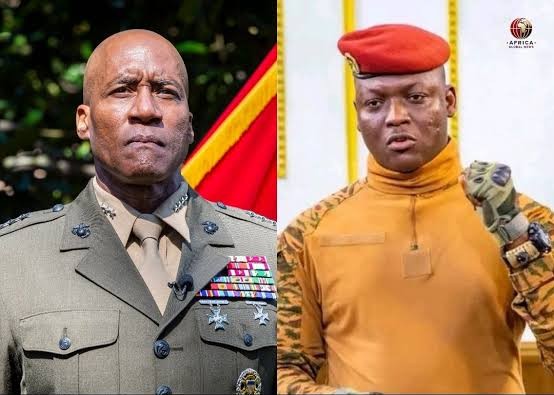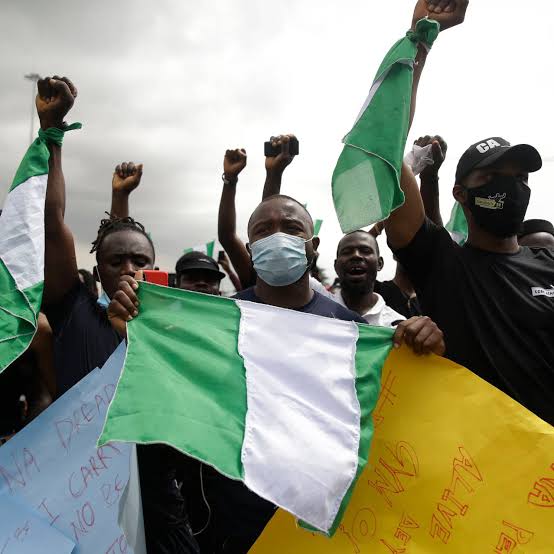Opinion: Is US condemnation of Burkina Faso’s Captain Traore a right initiative

US general and head of AFRICOM, General Langley (left) with Burkina Faso de-facto leader, Captain Traore (right). Photo Credit- Authors collage
The recent US Senate hearing, through AFRICOM Commander General Langley, reignited global debate by condemning Burkina Faso’s President, Captain Ibrahim Traore, alleging that the nation’s mineral revenues, particularly gold are being converted to fund and sustain his military regime rather than for the benefit of the people. This critique seems to paint Traore as a despotic leader. However, as Burkina Faso struggles with a jihadist insurgency that has displaced millions since 2015, the question looms: Is Western pressure, led by the US the right approach for a nation on the brink of survival, or is it a neocolonial overreach that ignores Burkina Faso’s complicated situation? This piece is set to explore a flawed narrative that risks segregating a leader fighting for sovereignty while offering little in the way of constructive solutions.
To begin this piece properly, allow me to critically explore a narrative that stems from neocolonialism. The US condemnation centers on the government of Captain Traore, accusing him of using gold revenues, with Burkina Faso being Africa’s fourth-largest gold producer to propagate his military administration, which seized power in a 2022 coup. General Langley’s Senate testimony, also criticized financial flows from Chinese cooperation, framing them as complicit in sustaining Traore’s regime. The US Department of State’s 2023 report further highlighted targeted forced conscriptions and shrinking civilian roles, pointing to Traore’s restrictions on political parties as evidence of democratic decline. On the surface, these critiques align with Western ideals of transparency and human rights but let’s be frank here, they are only oil on the heads of Burkina Faso’s existential threats.
Since 2015, jihadist violence has killed thousands and displaced millions. Traore, a 36-year-old captain who fought in counter-insurgency operations like the 2019 Otapuanu offensive, rose to power on a promise to restore security, a promise the many previous government, backed by France, failed to keep. His decision to expel French forces in 2023 and push for Russian support, shows a rejection of Western influence that the US now seeks to punish. But is this condemnation fair when their own interventions, like France’s Operation Sabre, failed to curb the insurgency, leaving Burkina Faso to defend itself?
RELATED STORIES
Global Tariff War: Why Nigeria should embrace China
Somalia, Nigeria, Ghana top the African list of Trump’s deportation move…see full list
As stated earlier that this critique just only shows neocolonialism, a sentiment echoed by several Pan-African organizations, other African governments, and myself. Burkina Faso’s gold sector, a lifeline amid conflict, is being developed under Traore’s watch, his government approved the country’s first gold refinery in 2023, aiming to retain more value domestically. But, the US frames this as corruption, ignoring how Western nations historically exploited Africa’s resources as noted by many social media users, “The US wants Burkina Faso’s gold for itself, not for the people.” This is just another page in the historical patterns of Western influence in Burkina Faso or other African countries, which is always marked by neocolonial control, with 350-400 French troops stationed near Ouagadougou until their 2023 expulsion.
Now, permit me to compare this selective criticism. Saudi Arabia, a key ally to the US and other Western nations, faces no such criticism despite its stark human rights abuses and civil violations. Burkina Faso, an underdog, becomes a scapegoat for Western frustration over losing influence in the Sahel, a region Traore seeks to federate with Mali and Guinea. The US condemnation feels less about democracy or ensuring sovereignty and more about control, punishing Traore for choosing autonomous governance over Western dictates.
The US pressure offers no solutions for Burkina Faso’s core challenge: security and poverty. Traore’s regime, while imperfect, has prioritized local forces over foreign dependency, refusing Wagner’s direct combat role as of 2023. His forced conscriptions, though harsh, aim to bolster a military stretched thin by jihadist attacks an approach the US criticizes without addressing the insurgency’s root causes, like poverty and maladministration. Worthy to be noted is that French counterinsurgency efforts have occasionally failed, fueling anti-Western sentiment. Why, then, does the US expect Traore to succeed under the same conditions, without the support?
Economic sanctions or diplomatic pressure, as implied by the US stance, risk further isolating Burkina Faso, pushing it deeper into Eastern alliances. The US Department of State’s 2023 call to “promote human rights” is only smoke without fire as there is no concrete aid, like funding for education or anti-insurgency training. Instead, the US wants to segregate a leader who, despite his flaws, commands large support for resisting neocolonialism.
Final take
So much is left to discuss but it is wise to draw the curtain close. Burkina Faso needs partners, not critics. The US should prioritize collaboration and not condemnation, offering technical aid for governance reforms while respecting Traore’s stance on sovereignty and a willingness to adapt is enough reason to support him. Traore’s fight for Burkina Faso’s future gold refineries, security, and regional alliances deserves closed engagement, not censorship and criticisms.
As Burkina Faso navigates its fragile transition, the U.S. must rethink its approach. Condemning Traore risks repeating the West’s failures in the region, where heavy-handed tactics increased global resentment. Burkina Faso’s people, battered by violence and poverty, need stability, not threats. If the West truly cares about democracy, it should help Traore build it on Burkina Faso’s terms, not theirs. Anything less is just another chapter in a long history of misguided interferences and neocolonialism.




